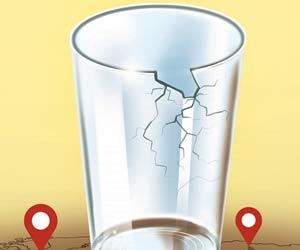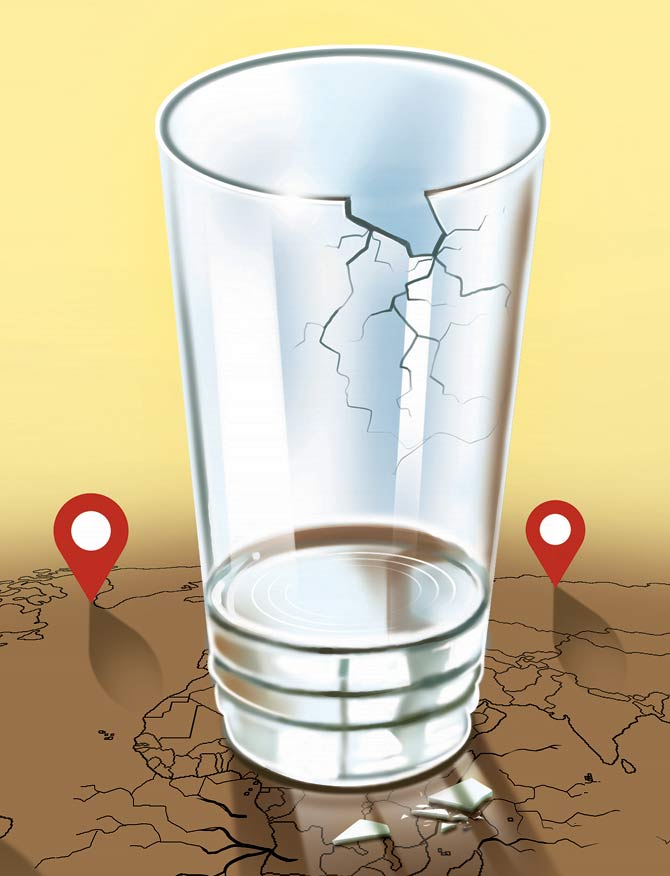Are we going to run out of drinking water? Very much, if our current consumption patterns continue, believes the UN. So how did we arrive at this crisis, which is clearly more man-made than natural? mid-day breaks it down


Illustration/Uday Mohite
ADVERTISEMENT
2025 - the year when the world may run out of drinking water, as highlighted in several reports, studies and surveys. And the reason it's being talked about more now is because the day (or Day Zero, as it's being called) is just months away for Cape Town, likely to get the distinction of the first modern city to run out of the everyday elixir — July 9 has been given as the day the city will have to turn off its taps.
Closer home, we have Bengaluru, said to be first in line to be hit by the drinking water bullet, according to a recent report by the BBC. India's IT hub is second on BBC's list, just behind Brazil's Sao Paulo. Though no other Indian city is in the list, several metros and major cities are no better when it comes to taking care of their resources.
Down the drain
Here in India, our elected representatives seem allergic to tried and tested methods, such as desalination that's been successful in other countries; neither has anything concrete been done to clean up our waterbodies — lakes and rivers — that continue to be pumped with garbage, chemical effluents and other waste. What's worse, our waterbodies are also increasingly being built over, as concrete structures mushroom to accommodate our ever-growing numbers. And the less said about dingy and dirty water pipelines, which burst anytime, anywhere, leading to colossal wastage, the better.
Want to know how we have been digging our own grave? here are a few reasons
>> A mere 2.5% of Earth's total water is fresh water.
>> Ever-growing population and increasing affluence has put stress on the available fresh water...
For example, it takes 400 bottles of water to produce one bottle of wine.
>> According to a Wikileaks report, growing meat consumption is another reason…
>> A calorie of meat needs 10 times as much water to produce as a calorie of crop.
>> And the big one: climate change — for every degree Celsius of global warming, about 7 per cent of the world's population will see a drop of at least 20 per cent in renewable water resources, as per the UN.
What's the Local scene?
Madhav Chitale, water expert
'Mumbai will never face a situation like the one in Cape Town; things are different here. Dams supplying water to the
city have enough storage capacity to cater to citizens' requirement. The pipelines are underground, so there is no question of any risk to those. Also, the natural conditions are different here — the city gets enough rainwater. Mumbai's problem is the rising population. So, citizens need to be conscious and cautious and avoid wasting water.'
Dhaval Desai, ORF research fellow
'Our city has enough water stock, but what we need to do is curb the non-revenue water (amount of water wasted during transportation), which is around 900 million litres daily. These many litres are lost due to pilferage, leakage and other means. While we have enough sources of water, what our city requires is a consolidated plan to stop all sorts of wastage. These 900 million litres of water can easily fulfil requirements of a city like Pune.'
45
Number of countries facing water shortage
37
Number of conflicts between countries over water since 1947
2,000
Minimum litres of water a person needs daily
2030
Year by which global demand for fresh water is projected to grow by more than 40%
BBC's stressed cities
#01 Sao Paulo
#02 Bengaluru
#03 Beijing
#04 Cairo
#05 Jakarta
#06 Moscow
#07 Istanbul
#08 Mexico City
#09 London
#10 Tokyo
#11 Miami
Inputs/ Laxman Singh
Catch up on all the latest Mumbai news, crime news, current affairs, and also a complete guide on Mumbai from food to things to do and events across the city here. Also download the new mid-day Android and iOS apps to get latest updates
 Subscribe today by clicking the link and stay updated with the latest news!" Click here!
Subscribe today by clicking the link and stay updated with the latest news!" Click here!






